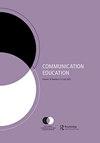美国媒体和传播领域的任期和晋升指南及其对参与奖学金的支持综述
IF 0.8
Q3 COMMUNICATION
引用次数: 0
摘要
学术界人士之所以选择自己的道路,是因为他们想在社会、社区或实践中做出积极的改变。学术界应该接受各种各样的场所和方法,因为理论、批判性和应用性的知识创造方法可以相互交流,帮助社会理解其复杂问题,并评估这些问题的解决方案。顾问、参与学者和艺术家等非传统学者经常选择在学术期刊或书籍之外的场所(如教育视频、播客、报告)传播他们的作品,目的是将非学术与他们的作品联系起来(Miller,2022)。参与的学者通常更喜欢与非营利机构、政府和其他机构建立伙伴关系,通过提供现实世界的解决方案或刺激对话来丰富社区(Waisbord,2020)。在这篇文章中,我认为申请、外联和咨询工作应该属于敬业奖学金的保护伞。教育研究人员欧内斯特·博耶(Ernest Boyer,1990)的工作经常被认为是承认参与式学术价值的催化剂。Van de Ven(2007)将参与式学术描述为“一种参与式研究形式,用于获得关键利益相关者的建议和观点……以了解复杂的社会问题”(第九页)。Van de Ven(2007)指出,参与研究应解决特定问题;此外,学者们不应该强调创造可概括的信息,因为参与式学术专注于帮助基于社区的项目。学术参与是指应用或交流智力、艺术和专业知识、知识、技能或资源,以造福外部非学术利益相关者,可能涉及学术界和非学术界之间的合作(Miller,出版)。然而,学院和大学通过制定终身教职和晋升指导方针来限制学者从事这类工作,该指导方针规定了哪些类型的奖学金有效和不有效。学术界复杂的教师奖励结构往往对那些选择与可接受的学术成果(如期刊文章或图书出版物)的解释相反的途径的学者不利。积极参与的学者批评任期和晋升文件没有正确承认这种方法(Van de Ven,2007)。从历史上看,大学和系领导层依靠期刊出版量和生产力等指标来评估候选人的表现(Saaty&Ramanujam,1983)。长期持有的信念和规范需要在支持参与方法的势头的基础上,在此时此刻重新审视(Waisbord,2020)。本文章由计算机程序翻译,如有差异,请以英文原文为准。
A review of U.S. tenure and promotion guidelines in media and communication and their support for engaged scholarship
People within academia choose their path because they want to make positive differences in society, in their community or practice. A diversity of venues and methodological approaches should be accepted within academia, because theoretical, critical, and applied approaches toward knowledge-making can inform one another to help society make sense of its complex problems and evaluate solutions to those problems. Nontraditional scholars such as consultants, engaged scholars, and artists frequently choose to disseminate their artifacts in venues (e.g., educational videos, podcasts, reports) other than academic journals or books with the goal of connecting nonacademics with their work (Miller, 2022). Engaged scholars often prefer to form partnerships with nonprofit institutions, the government, and other institutions to enrich communities by providing realworld solutions or stimulating dialogue (Waisbord, 2020). In this essay, I argue that applied, outreach, and consulting work should fall under the umbrella of engaged scholarship. Educational researcher Ernest Boyer’s (1990) work is often cited as the catalyst for recognizing the value of engaged scholarship. Van de Ven (2007) described engaged scholarship as a “participatory form of research for obtaining the advice and perspectives of key stakeholders... to understand a complex social problem” (p. ix). Van de Ven (2007) stated engaged research should address and resolve a particular problem; moreover, scholars should not emphasize creating generalizable information, since engaged scholarship concentrates on helping community-based programs. Engaged scholarship is the application or exchange of intellectual, artistic, and professional expertise, knowledge, skills, or resources to benefit external nonacademic stakeholders that may involve collaboration between academics and nonacademics (Miller, in press). Yet colleges and universities constrain academics from doing this type of work by creating tenure and promotion guidelines that state what types of scholarship count and do not count. A complex faculty rewards structure within academia often disadvantages scholars who select paths that counter interpretations of acceptable scholarship output such as a journal article or book publication. Engaged scholars criticize tenure and promotion documents for not properly acknowledging such approaches (Van de Ven, 2007). Historically, university and departmental leadership rely on proxies such as journal outlet and productivity to assess a candidate’s performance (Saaty & Ramanujam, 1983). Long-held beliefs and norms need to be readdressed at this moment in time based on momentum supporting engaged approaches (Waisbord, 2020).
求助全文
通过发布文献求助,成功后即可免费获取论文全文。
去求助
来源期刊

COMMUNICATION EDUCATION
EDUCATION & EDUCATIONAL RESEARCH-
CiteScore
3.10
自引率
34.80%
发文量
47
期刊介绍:
Communication Education is a peer-reviewed publication of the National Communication Association. Communication Education publishes original scholarship that advances understanding of the role of communication in the teaching and learning process in diverse spaces, structures, and interactions, within and outside of academia. Communication Education welcomes scholarship from diverse perspectives and methodologies, including quantitative, qualitative, and critical/textual approaches. All submissions must be methodologically rigorous and theoretically grounded and geared toward advancing knowledge production in communication, teaching, and learning. Scholarship in Communication Education addresses the intersections of communication, teaching, and learning related to topics and contexts that include but are not limited to: • student/teacher relationships • student/teacher characteristics • student/teacher identity construction • student learning outcomes • student engagement • diversity, inclusion, and difference • social justice • instructional technology/social media • the basic communication course • service learning • communication across the curriculum • communication instruction in business and the professions • communication instruction in civic arenas In addition to articles, the journal will publish occasional scholarly exchanges on topics related to communication, teaching, and learning, such as: • Analytic review articles: agenda-setting pieces including examinations of key questions about the field • Forum essays: themed pieces for dialogue or debate on current communication, teaching, and learning issues
 求助内容:
求助内容: 应助结果提醒方式:
应助结果提醒方式:


